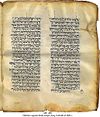|
|
||
|---|---|---|
| Apologetics |  |
|
| Literature |
Ancient biography • Apocrypha • Biblical Canon • Dead Sea scrolls • Deuterocanonicals • Douay-Rheims Bible • General reliability method • Gospel • King James Version • List of books • Masoretic text • New Testament • Old Testament • Q source • Septuagint • Textual criticism • Vulgate
|
|
| Geography |
Assyria • Babylon • Bethlehem • Babylonia • Capernaum • Ancient Near East • Caesarea • Dead Sea • Eden • Egypt • Ephesus • Hittite Empire • Israel (United kingdom) • Israel • Jerusalem • Jericho • Judah • Megiddo • Mount Ararat • Nineveh • Phoenicia • Rome • Sodom and Gomorrah • Tower of Babel • Qumran
|
|
| Feature articles |
Antediluvian world • Biblical astronomy • Chronology • Christianity • Church • Creation • Epistemology • Flood of Noah • God • Hermeneutics • History of Christianity • Jesus Christ • Judaism • Judges • Religion • Sin
|
|
| Biographies | ||